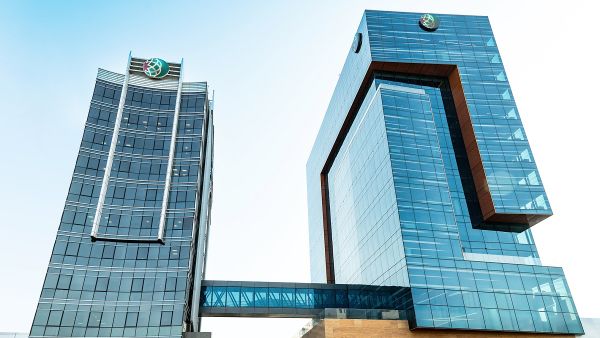Dubai Islamic Bank Full Year 2023 Group Financial Results

Dubai Islamic Bank (DFM: DIB), the largest Islamic bank in the UAE, today announced its results for the period ending December 31, 2023.
FY 2023 Highlights:
Group Net Profit came in at AED 7,010 million, up 26% YoY compared to AED 5,552 million, driven by rising non-funded income and lower impairment charges.Net financing and sukuk investments reached AED 268 billion, up 12% YoY. Gross new underwriting and sukuk investments recorded AED 88 billion vs AED 63 billion in FY 2022. Over the year, the frequency of early settlement payments has retracted tremendously by 31% YoY leading to net growth in new financing and sukuk disbursements to AED 29 billion.Total income reached to AED 20,142 million compared to AED 14,101 million, a solid expansion of 43% YoY.Net Operating Revenues showed a robust increase of 11% YoY to reach AED 11,665 million. Net Operating Profit came at AED 8,503 million, a 10% YoY increase compared to AED 7,734 million in FY 2022.Balance sheet expanded strongly by 9% YoY to AED 314 billion. Customer deposits increased to AED 222 billion, up 12% YoY with CASA comprising 37% of DIB’s deposit base. Traction towards investment deposits has continued increasing their contribution to total deposits to 63% from 56% in YE 2022. Impairment charges registered AED 1,396 million against AED 2,103 million in FY 2022, down by 34%. Separately, 4Q 2023 registered impairment reversal of AED 13 million down 102% YoY and 103% QoQ.NPF falling largely below the 6% mark, now at 5.4% compared to 6.5% at YE2022, lower by 110 bps YoY and 60 bps QoQ. Cash Coverage rose to 90%, up 1200 bps YoY.Cost to income ratio at 27.1%, staying below guidance. Liquidity remains healthy with LCR at 188.7%.Continued improvement on ROA now at 2.3% (+30 bps YoY) and ROTE at 20% (+300 bps YoY).Capitalization levels remain robust with CET1 at 12.8% (-10 bps YoY) and CAR at 17.3% (-30 bps YoY), both well above the minimum regulatory requirement. Total equity now stands at AED 47 billion.
Management’s comments for the period ended 31st December 2023:
Financial Review
Income statement summary
Balance Sheet Summary
Operating Performance
The bank’s Total Income rose to AED 20,142 million in FY 2023 demonstrating a solid growth of 43% compared to AED 14,101 million driven by strong income from funded and non-funded income. Non-funded income advanced by 23% YoY over the reporting period supported by fees & commissions and income from investment properties in line with Dubai’s strong property rental market in addition to other income account due to one off item gains. Particularly in 4Q 2023, non-funded income exhibited a strong quarter, YoY and QoQ up by 48% and 19%, respectively, as commissions rose by almost 40% (on a YoY basis) due to higher financing processing fees while also other income supported the growth. This is clearly reflected in the Net Operating Revenue which grew by 11% YoY to reach to AED 11,665 million compared to AED 10,467 million last year.
Pre-impairment profit increased by 10% YoY reaching to AED 8,503 million compared to AED 7,734 million. Impairment charges stood at AED 1,396 million down by 34% YoY. It is worth highlighting, 4Q 2023 witnessed reversal of impairment charges in tune if AED 13 million.
Operating expenses amounted to AED 3,162 million for the year vs AED 2,733 million in FY2022, exhibiting 16% YoY increase. Cost income ratio registered 27.1%, up 100 bps YoY.
Group Net Profit witnessed a robust increase of 26% YoY to reach AED 7,010 million vs AED 5,552 million in FY 2022. 4Q 2023 net profit registered AED 2,186 million up 28% QoQ and 51% YoY.
Net profit margin increased to 3.1% (10 bps YoY) with ROA and ROTE at a healthy 2.3% and 20% up by 30 bps and 300 bps YoY respectively.
Balance Sheet Trends
Net financing & Sukuk investments stood at AED 267 billion, up 12% YoY from AED 238 billion in FY 2022. DIB’s net financing assets were up by 7% YTD while the Sukuk investments portfolio, another key focus of the bank, expanded by nearly 30.5% YoY to reach to AED 68 billion.
DIB witnessed stellar disbursements in its gross new financing and sukuk portfolio during FY 2023 amounting to nearly AED 88 billion, up 40% compared to AED 63 billion in FY 2022. The bank’s sukuk portfolio continued its resilience witnessing gross new investment of AED 21 billion up 52% YoY compared to FY2022. Gross corporate financing origination surpassed AED 45 billion, (45% YoY), driven mainly by large corporates and regional cross border financing, while new bookings from consumer financing followed suit up 22% to AED 22 billion driven by automotive, personal finance and SME business underpinning DIB’s strong franchise despite a competitive market. This resulted in gross new financing of AED 67 billion up 37%. Routine repayments for the period continued to flow in at AED 23 billion and AED 17 billion from the corporate and consumer segments respectively. Similar to the earlier part of the year, the momentum of early settlements continued to retract over the period by 36% YoY to AED 14 billion compared to AED 21 billion last year. This has resulted in net positive financing incremental growth of AED 13 billion in DIB’s portfolio over the FY 2023 period compared to balanced growth last year.
Customer deposits registered AED 222 billion as of FY 2023 up by 11.8% YoY equally supported by the consumer and corporate accounts. CASA now stands at AED 82 billion, comprising 37% of deposits. Migration to wakala deposits (investment deposits) was a persistent trend over the year due to the current global rate scenario. This is reflected through an increase in contribution of investment deposits to the total deposit base to 63% from 56% in FY 2022. Liquidity coverage ratio (LCR) at 188.7%, up from 150.4% FY 2022, remains above regulatory requirement, depicting strong liquidity position.
Non-performing financing (NPF) ratio improved to 5.4%, down a solid 110 bps compared to FY 2022 NPF ratio of 6.5%. Core DIB NPF account which comprises 83% of the total NPF account was the main contributor to the improvement in the asset quality. Corporate settlements pertaining to legacy real estate exposures resulted in an 11% decrease in absolute NPFs. This led to core DIB NPF ratio dropping by 85 bps to 4.5% versus 5.35% in FY 2022. Moreover, recoveries from NMC and NOOR POCI are ongoing which resulted in a decline of also 13% in their absolute NPF exposure. Accordingly, coverage ratio across all three accounts improved significantly YoY.
Stage 2 financing dropped by 8% YoY and 22% QoQ to AED 14 billion. Improvement in average risk grades for certain accounts during 2023, along with few large accounts returning to stage 1 after completing curing period, both led to decline in stage 2 exposure. As a result, Stage 2 coverage ratio improved to 9.1% up 160 bps YoY. Similarly, Stage 3 coverage improved to 68%, (+710 bps) from FY2022.
Cash coverage ratio rose to 90% (+1200 bps YoY, +600 bps vs 9M 2022) and overall coverage including collateral at 121% (+1100 bps YTD and 400 bps vs 9M 2022). Cost of risk on gross financing assets improved to 60 bps compared to 80 bps for the year 2022.
Capital ratios continue to remain strong with CAR now at 17.3% and CET 1 ratio at 12.8% (down 10 bps YoY), both well above the regulatory requirement.
Business Performance (2023)
Consumer Banking portfolio increased to AED 56 billion up 8% from AED 52 billion in FY2022. The portfolio’s total new underwriting of AED 22 billion during the year increased from AED 18 billion in FY 2022, up 22% YoY. All consumer segments witnessed strong growth particularly auto finance which featured a 37% jump YoY, SME business up 86% and Personal Finance up 20% YoY in gross new underwriting. Despite routine repayments of AED 17 billion, the portfolio added AED 4.5 billion of net new underwriting in FY 2023 versus AED2.8 billion in FY 2022. The business generated AED 5.3 billion in revenues during the year up by 9% YoY from AED 4.9 billion during FY 2022. Blended yield on consumer financing grew by 82 bps YoY to reach to 6.78%. Separately, on the funding side, consumer deposits witnessed a 12% increase YoY to AED 88 billion as investment deposits gained traction from customers while consumer CASA remained steady YoY at AED 48 billion.
Corporate banking portfolio now stands at AED 143 billion up 7% YoY driven by growth in the services, utilities, automobile and financial institution sectors. Gross new corporate financing for FY 2023 bolstered to AED 45 billion up 45% YoY, while repayments and early settlements registered AED 37 billion, leading to AED 9 billion growth in the portfolio over the full year, compared to no growth in FY 2022. This growth features a robust recovery in the corporate portfolio as the bank’s strong liquidity position enabled it to deploy financing strategically into cross border and to large corporate clients, coupled with a significant drop in early settlement. Revenues increased by 1% to AED 2,882 million. Yield on corporate financing portfolio expanded by 263 bps YoY to 6.48% compared to 3.85%. The stellar yield expansion is attributed to increasing share into industries fueling the UAE’s economic growth. Separately on the funding side, corporate deposits increased by 12% YoY while CASA was impacted by 9% YoY as large corporates continued to rotate their funds into higher yielding deposits.
Treasury continued to provide a strong engine for growth as the curator of the bank’s fixed income book. The sukuk investment portfolio now stands at AED 68 billion, up a hefty 31% YoY, constituting a noteworthy 22% of the bank’s assets. Gross new sukuk investments during the year amounted to AED 21 billion, up 52% YoY, leading to net growth of AED 16 billion for the period. The portfolio carries an attractive yield of 4.6% up 58 bps YoY.
Key Highlights (FY 2023)
DIB launched NEST, a sustainable Home Finance product, a tangible embodiment of the Bank's pledge to support the creation of sustainable communities. 'Nest' offers a suite of financial products tailored to empower customers to invest in green homes, as well as ancillary finance for solar panels and sustainable construction materials, fostering an environmentally conscious lifestyle.In 2023, DIB was an Associate Pathway Partner for the COP 28 UAE event where the bank actively participated in the annual UN Climate Conference. Together with the UAE Banking Sector, DIB has committed to mobilise AED 1 trillion into sustainable financing by 2030. In addition, several other ESG initiatives such as “One Tree for Everyone” and “NEST (Sustainable Home Finance) were launched during the year in line with the UAE’s Year of Sustainability. Moreover, the bank also committed on the UAE climate responsible companies pledge where DIB will aim to strengthen its sustainability ambitions and reduce its carbon footprint in line with the UN global sustainable development goals.DIB has embarked on a pioneering endeavor to nurture financial literacy among the youth through its innovative Youth Financial Empowerment Forum, providing them with valuable information and resources to help them become more financially empowered. The bank has a rich history of working in collaboration with organizations that share its vision for youth development. Over the past two campaigns with KFI Global, DIB has collaborated with approximately 50 schools, impacting up to 4,000 students positively. This initiative is designed to enhance financial literacy and equip young individuals with the knowledge and tools for financial success.
DCM and Syndication Deals (FY 2023)
Awards List (2023 YTD)
Background Information
Dubai Islamic Bank
Since its formation in 1975 as the world’s first full-service Islamic bank, Dubai Islamic Bank has established itself as the undisputed leader in its field, setting the standards for others to follow as the trend towards Islamic banking gathers momentum in the Arab world and internationally.






